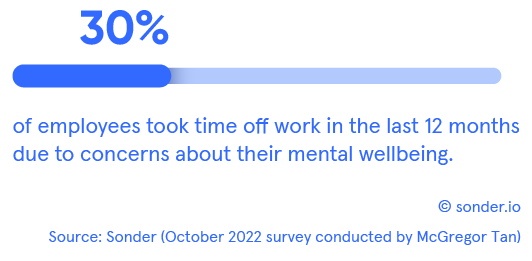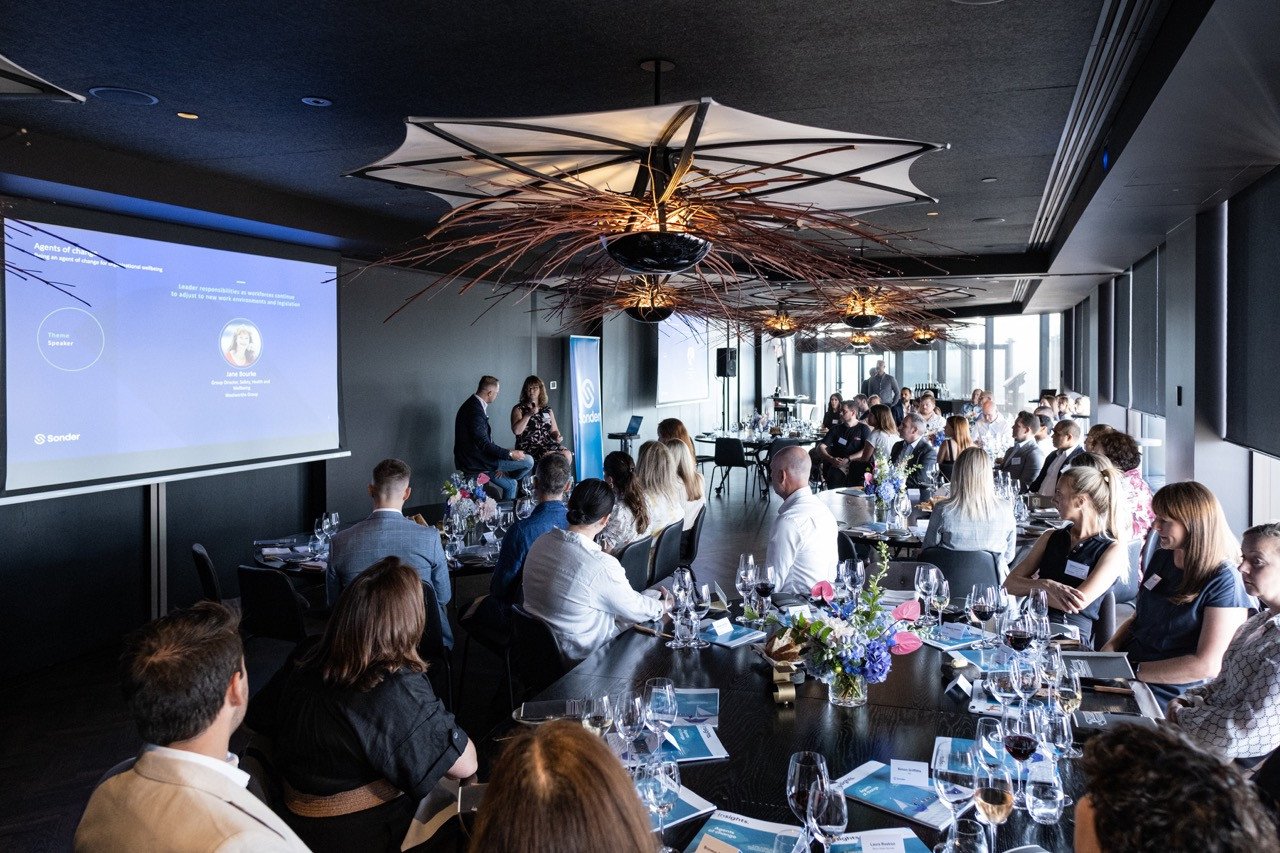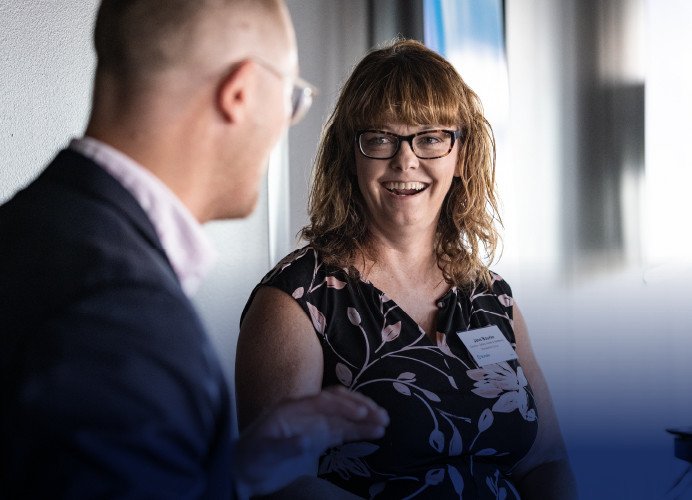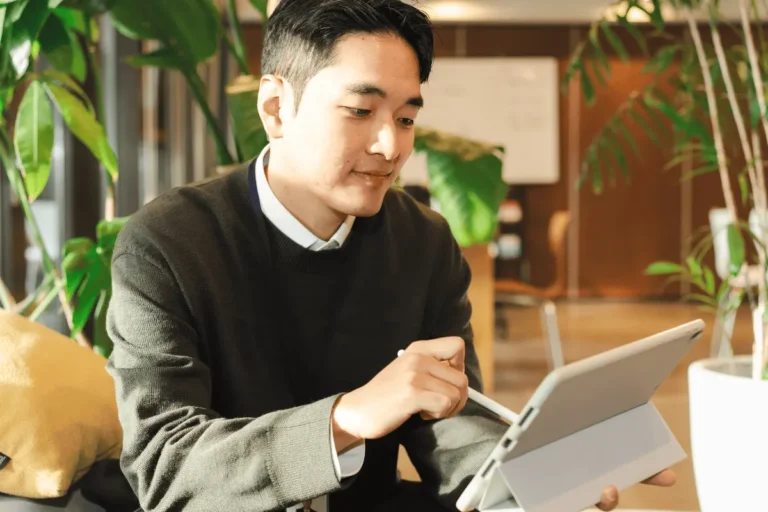Recently, we were delighted to host a gathering of wellbeing leaders at our Agents of change for organisational wellbeing event in Melbourne. Transformational change only happens when leaders ‘walk the talk’, so we were keen to hear how two accomplished wellbeing leaders, Jane Bourke (Woolworths Group) and Sean Silvey (IAG) were building healthier organisations for their people. This post covers the first part of the event – our interview with Jane.
Panellists
Guest: Jane Bourke
Group Director, Safety, Health and Wellbeing, Woolworths Group
Jane is a globally-accomplished professional with extensive leadership experience in developing and executing a strategy to drive sustainable business performance.
Jane’s experience has taken her to senior roles within global companies (Amazon, BP) and Australia’s Top 20 companies (Origin Energy,Telstra) – working best in transformation and change roles in complex environments which require a strong risk-based approach with business acumen.
She has significant experience with HSE transformation; mergers and acquisitions; retail; construction programs; oil and gas; transport, logistics and warehousing.
Host: David Watson
Head of Enterprise, Sonder
David is a culture-focussed business leader who heads the enterprise business at Sonder.
He is passionate about helping others and sharing ideas and innovations, especially as it relates to workplace wellbeing and holistic safety.
Prior to Sonder, David was a founding team member at LinkedIn Australia and also worked at world-class organisations such as KPMG, IBM, and Salesforce.
Transcript
David Watson:
Hello. Good afternoon everyone. Firstly, welcome to the Sonder Agents of Change event. Absolutely thrilled to see so many wonderful people here today. Soon I’ll be introducing today’s program and our wonderful speakers. Here’s one sneaking through now. But before I begin, I’d like to begin by acknowledging the traditional owners and custodians of the land on which we meet today. The Wiradjuri people, part of the Kulin… nation, and to pay my respects to elders past and present.
I’m absolutely thrilled to be here today as your host. We’ve got an amazing agenda ahead of us, a couple of incredible speakers.
For those of you I haven’t met yet, my name is Dave Watson, and I lead the Enterprise business at Sonder. So, thanks for coming, and we really look forward to sharing some really informative information for you all today.
Publishing Agents of Change was a natural extension of the work that we do at Sonder. Natural because we’re in the business of wellbeing, and the business of leadership.
Today we’ll hear from two inspiring leaders, both agents of change who are driving positivity – both in their workplace but also in the community around them.
Firstly, Jane Bourke, Group Director, Safety, Health and Wellbeing, from Woolworths Group, over to my left – hello, Jane.
And Sean Silvey, Executive Manager, Safety and Wellbeing, from IAG. Sean is over in the back corner – hello, Sean.
Now truly transformational change only happens when leaders commit. These are two companies, two really proud customers of ours, who are building a culture of active care, and we look forward to hearing from both of them this afternoon.
So, why are we here? In 2021 and again in 2022, Sonder commissioned a large survey. First year, 1,025 people, and last year in October, around 2,000 people. The survey taught us three really overwhelming trends.
Number one, unfortunately, many employees are not well – 72 per cent of employees either feel or have felt depressed, 25 per cent of employees are contemplating or have considered suicide.
And many workplaces are also not well – 50 per cent of employees have been subject to bullying or harassment, and 35 per cent of employees have experienced aggression from their managers.
The follow-on survey that we did in October last year showed that 44 per cent have experienced poor managerial support, and that number of people that have suffered aggression from their managers actually went up to 37 per cent.
And 30 per cent have taken time off work in the last 12 months because of issues with their mental health.

Obviously, these statistics are quite alarming, and we all agree that something needs to change.
Now the good news is there was a third theme that came out from that particular survey. So, positivity does exist.
And when it came to questions around leadership, 80 per cent said that seeing or hearing leaders talk about their own mental health and wellbeing makes them feel like they can also speak up as well, which is fantastic.
Today we are building on the Agents of Change report. It’s in front of you all, so if you haven’t read it, please deeply contemplate it and review it, it’s a wonderful piece of thought leadership.
It proposes that agents of change fulfil five key roles – the embracer, the investigator, challenger, integrator, and advocator.
These roles will form a part of the discussion with our special guests this afternoon.
Another area of focus today – and it’s a topic that I actually find a little bit kind of overwhelming and confusing – and that’s around the regulatory environment related to psychological health and safety.
It’s a topic that can be quite technical, and there’s a heap of change happening across every state in Australia with different regulations in place.
And I’m hoping that we can learn a little bit from Jane and Sean’s experience today, and obviously everyone else in the room, so we can all be better informed going forward.
So, to kick us off and without further ado, I’d like to welcome our first guest, Jane Bourke, up to the stage. Thanks, Jane.
Now to introduce Jane, Jane was appointed the Group Director of Safety, Health and Wellbeing at Woolworths in March last year. Jane is a globally accomplished professional with extensive leadership in developing and executing strategy to drive sustainable business performance.
She’s got significant experience with HSE transformation, M&A, retail, multibillion dollar construction projects, and she has a huge amount of experience working all around the world.
You’ve lived in the UK, Bangladesh, Hong Kong, and most recently, the USA. Jane’s also got an MBA from our very own Melbourne Business School.
So, please put your hands together for Jane. Thanks so much for coming, Jane.
So, to kick us off, Jane, I’d love for you to share with the audience just a little bit about your background, including both your executive role that you hold at Woolworths now, but the interesting tidbit of you actually started your career as a team member at Woolworths, as well. So, love to hear a bit more about that.
Jane Bourke:
Thank you. So, I do have a little bit of a corny joke that most people at Woolies have now heard. I’ve actually been with Woolies about 33 years, and I took a little sabbatical for about 25 of those. So, I actually started at Woolies as a kid, so back when I was, I think 14 years, 9 months, as you do. I was eager to get a job, and I started at Woolies, and I was in the deli. And I originally started in Bendigo, so most of you should know Bendigo – you Victorians.
And then when I went to university in Melbourne, I transferred to Melbourne. And it was very interesting actually, and I’ve got someone from the team here, Georgia, who knows… she runs our state here.
I moved to Melbourne, and they relocated me, store-wise, to Fitzroy. So, imagine back in 1993 – and you can start guessing my age – Fitzroy in 1993 – and Jane, the little girl that was really naïve, just bright-eyed, and they put me at Fitzroy in the deli that’s still, I think, in the same spot as 1993, in the back. And people with drugs, alcohol, homeless, and I was bushy-eyed and just like, what the…!
And it’s a true story that nine months after I arrived at Fitzroy, I went back to my store manager in Bendigo and said, “Can I drive back every weekend and just work back in Bendigo because I can’t handle it in Fitzroy?”
And so, I worked the summer with them, and then Carlton. I went to Carlton and I said, “Oh, do you have a job for me?” and they said yes. And Carlton was a much better fit for me, being quite new to Melbourne. So, that’s my little story about Woolies.
So, I did eight years in the deli, and still it’s my favourite spot. Went back at Christmas time, to Bendigo, did a couple of days in the deli, and the store were like, “Why are you helping us?” I said, “I love this”.
So, that’s my story. So, I grew up in Bendigo and didn’t think that… I thought I was going to live in Bendigo for pretty much my life.
And I was going to be a hairdresser, had my life sorted, and just somehow, my mother, who was a hairdresser, encouraged me to think about the big world out there. And now, I’ve spent 10 years out of my 25-year career living overseas.
So, most recently, I was at Amazon. So, I did about five years with Amazon – about four and a half years of that in the U.S.
Watched it grow from 300,000 people to 1.6 million people. And we used to think that, you know… I was responsible for startup launch, all the technical side of safety, and we used to think launching a hundred sites a year globally was a lot.
When I left, we were launching over a thousand sites a year. So just phenomenal growth in the five years that I was there.
But I’ve done other things – lived in Hong Kong, with Telstra, did a lot of merger and acquisition work with them. Most challenging situation was trying to do a joint venture on construction for the third mobile network in the Philippines. That was just Telstra here and the Filipino company down here, and how you think about safety.
Worked in oil and gas, so offshore platforms here in the Bass Strait. We did a construction. I think the largest construction program in the Southern Hemisphere to put on a manned facility offshore with Origin Energy. Worked downstream with BP at their petrol stations.
So, I’ve had a lot of diversity in what I’ve been doing. But my original profession was occupational therapy. So, I won’t call myself an OT because I think it disrespects OTs who are registered now. It’s great having the knowledge around the physical health and also the psychological health. And I kind of look back now and go, where we’re going from psychological health, I’m pulling upon a lot from those earlier days.
So, that’s a little bit about my background.

David Watson:
Yeah, I learnt a lot, and we’ve caught up a few times this week. So, I find the Woolworths business super fascinating. It employs nearly one per cent of our population. We spend a lot of time in there, I feel like I’m at Woolworths almost every day, trying to feed my family.
Clearly, the last few years have been a pretty challenging environment, trying to feed the nation, work through the pandemic. Unfortunately, things like customer abuse, staff shortages, a range of other social issues – trying to keep staff. How have you gone about building the strategy at Woolworths to keep people engaged and make sure that you can continue to help feed all of us as you go along?
Jane Bourke:
Yeah, it’s a great question and look, I’ve only been at Woolies [since] a year ago, and if you think about Woolworths, they’re the largest employer in Australia and New Zealand – 200,000 employees – add on probably another 10/20/30,000 contractors, it’s a pretty big workforce. And mind blowing that we have 29 million interactions every week with customers. 29 million.
So, a lot of people go, why did you leave Amazon and go to Woolies? And to be honest, some of the Amazon executives in the U.S. went, “Why are you going to a hillbilly supermarket?”
And I have to sit here and go, one of the big reasons is, I’ve been back in Australia for about 18 months, and I’ve watched from afar what Woolworths has been doing – very, very purpose-driven – and that’s what connected with me – it’s very much around not only what we do for our teams and our role… in the community, and then also about care.
So, I can’t talk as much about what we did during COVID from first person experience, but I think what Woolworths very much put at the heart was, “How do we make sure that we care for our teams so that they feel safe turning up to work every day, to be able to…?”
It was critical infrastructure during those days of COVID. And unfortunately, we’re in a time at the moment where we’re talking a lot around… COVID’s probably, unfortunately, taught a lot of people to be anti-social.
Because we were isolated for a very long time and some of those behaviours are playing out in our supermarkets today – and Georgia can talk more about it – is the rudeness of customers to our teams and to each other is at an all-time high.
And then we look at violence and attacks, with interest rates going up and inflation, more brazen theft, and that impact on the teams.
So, for me, there’s a very big… it starts with the team, and “How do we care for the team, with that lens for the customer?”
David Watson:
Okay, and as you do more and more around wellbeing, what are some of the benefits that you see, either in keeping people or keeping customers happy? How does that kind of play out?
Jane Bourke:
Yeah, look, it’s interesting. We’re preparing a paper for the board at the moment, because they want to know where we’re at with regards to, probably mental health and wellbeing, so sort of narrowing it down, because there’s… and we’ll talk probably later on about wellbeing as a whole. And it’s been interesting to see the journey.
We’ve done a bit of a roadmap of where Woolies has been over the last 10 years and what we talk about. Probably 10 years ago, it was all about the fruit bowls, it was about yoga, it was about the gym – making people feel good. And it was about fixing the person and thinking well, EAP is the solution for that.
To, now, and again, it was an attractor of why I chose to come to Woolies – in the very first conversation I had with the Chief People Officer, she started talking about psychosocial risk. And I’m like, oh wow!
And we’ll talk about living overseas and the difference in some of that. But she had quite a good grasp on psychosocial risk and really being open and honest that they’re grappling with it and that it was an area that they realised that they need to move from this, let’s fix the person, to really thinking about as an organisation, how do we… “What role do we play in harm and what role do we play in actually helping people thrive when they’re at work?”
So, we’re on a big journey, like many. And there’s still a lot that we don’t know the answers to. But there’s a real leadership commitment around it, and I think that, for me, again, is an inspiring place to be working in, that I’m not having to actually be the one arguing about why we should be focused on this.
David Watson:
Yeah, awesome. So, let’s speak a little about that kind of regulatory environment then, I suppose. And the second piece of thought leadership on everyone’s table is, A simple guide to ISO45003, which I think is a really… It’s taught me a lot, but there’s a lot to it. And I find it to be a really kind of confronting topic, even some of the words, they can be very similar and mean very different things.
And then you’ve got different regulations being rolled out across the country at different times, different states adopting things, and then other states not, or delaying. And you’re obviously running a national business. How do you contemplate – I suppose it’s a philosophy – but how do you contemplate taking the good bits, making sure that you’re adhering to the guidelines, but also keeping the focus on the person, I suppose?
Jane Bourke:
Yeah, it’s quite interesting, because probably 12 months ago, if we think back 12 months ago, it might have been only Victoria that was muting actually putting some regulations specifically in and around psychosocial.
And for those around, I’m pretty sure everyone would go, we’ve always had a duty of care – it’s always been there. But now making it really explicit.
And they’d go… 12 months on, pretty much nearly every state has now got regulations around it from obviously the Model Act… coming down, Victoria’s still trying to make their mind up.
And again, my philosophy, and luckily this aligns with the company, they’ve never been doing it because of a compliance reason, it’s because actually, we want to care and we know that talent want to work for companies that actually care for them.
So, the way that we’re sort of tackling it is, if you focus on just the compliance, you’ll be a tick-a-box company. If you focus on actually “What does this mean to the organisation?” in that it’s very much a talent proposition, we know talent want to come and work for a company that actually cares about their wellbeing.
So, for us, it really is moving into the two phases of…
“What are the psychosocial risks in the workplace that we may have, and how we are managing them? And then, the next big phase that we’re trying to work on as well is, how do we help people thrive within the organisation?”
Jane Bourke, Group Director, Safety, Health and Wellbeing, Woolworths Group
So, I think, obviously, the legislation is great to guide. The ISO is another great framework. We did a gap analysis review. We had internal audit do it, which you never want auditors to do that.
But they did a great job, actually, so we didn’t call it an audit, we said, let’s do a readiness review, let’s just understand where we’re sitting against the framework. And again, let’s not use that as our tick-a-box framework to drive stuff through.
So, I think the standards and the guidance are great. And there’s a lot of great tools out there now that are readily available.
So, for those that may know Thrive at Work, so Sharon – I’m having a mind blank of her surname – Sharon Parker. So, if you don’t know who Sharon Parker is and if you don’t know Thrive at Work, write it down, really great resource.
The other one is the New South Wales Code of Practice, as well. I think, again, showing different ways of how do you think about psychosocial risk in the workplace.
David Watson:
You said something interesting before, around people are more and more attracted to companies that are doing the right thing. And that probably lends itself a little bit to the fact that you’ve got – what is it, like 65 per cent of your whole workforce is under 35 – so a reasonably young organisation.
I think that the views – and we were chatting earlier – we’re doing a lot of work with McDonald’s at the moment, and I look at the 16-year-olds that we’re looking after there, and I compare what I was like when I was 16, I was probably equivalent of a seven-year-old now. You know, they’ve got just such a different view of the world.
How do you go about engaging with a really young audience to make sure that you’re hitting the right notes, and you’re dealing with them in a language that they like, and you’re engaging this really different generation?
Jane Bourke:
Look, I won’t say that we’ve nailed it, without a doubt, because we’ve got such a diverse workforce. So yes, while 65 per cent of the workforce is below 35, the diversity amongst that, and then we do have other generations within the workforce. So how do we engage?
It’s multi-pronged. And probably some of the best ones that we’ve really got sliced… through, is really storytelling. Again, I’m sure all of us are using that, but that seems to be really powerful – when our teams are talking to each other and doing that storytelling – it seems to resonate.
Again, leadership led – if you don’t know Brad, who’s our CEO, go and Google him, watch him talk – he’s incredible at talking. And the way that he genuinely comes across to our teams.
And him as a person… I recently got him involved in his first-ever audit for safety with a regulator – I wanted him involved – and they asked him about how often does he get out with the workforce.
And he goes, “Why are you asking me that, Jane?” and I said, “Because how often do you go out, Brad?” and he goes, “I try to spend two days a week out with the workforce”.
And he goes, “That’s what every CEO leader should be doing”.
David Watson:
Should be.
Jane Bourke:
Yeah. And then, again, I went, well you are one of the leaders. And again, looking at the different ways to be able to cut through with some of the messaging and actually understand what’s happening on the ground.
Interested in part two of this event?
We’ll be posting a recap of the second half of this event tomorrow. To stay in the know, we invite you tofollow us on LinkedIn and/or regularly check our wellbeing insights.
About Sonder
Sonder is a technology company that helps organisations improve the wellbeing of their people so they perform at their best. Our mobile app provides immediate, 24/7 support from a team of safety, medical, and mental health professionals – plus onsite help for time-sensitive scenarios. Accredited by the Australian Council on Healthcare Standards (ACHS), our platform gives leaders the insights they need to act on tomorrow’s wellbeing challenges today.



